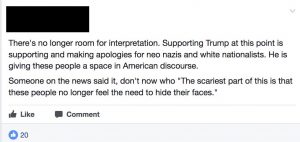The Moral Equivalence Argument
(A kind reviewer confirmed that this article could be read as an apology for views that equate progressive movements like AntiFa with Neo-Nazi movements. If you are so inclined to read it in that way, please consider this author note: This article is intended as a call to arms for progressive change, but I am arguing that such change must begin from inside the person rather than from outside the person. It performs exactly what I advocate in the article, namely that you must have a solidly grounded belief that your beliefs will win out, so be open about them and not afraid to engage differing positions. Not because the opposing view is morally equivalent but because you have confidence that your position will win out because IT is of higher moral standing.)
After recent events in Charlottesville, President Trump condemned both the so-called alt-right and alt-left. In a later address to the Nation, President Trump condemned by name neo-nazi and white nationalist groups. And in yet another press conference, President Trump once again condemned both extremists groups for the violence and deaths in Charlottesville.
Soon thereafter political and media punditry, as well as a number of citizens on social media, began decrying the President for opening a space for white nationalism in public discourse.
People have charged the President with casting neo-nazis as morally equivalent to groups like AntiFa. People charge him of creating a faulty equivalence.
Here is a post that captures what I believe to be a shared sentiment among President Trump’s critics:

The fear is palatable. It is understandable.
But what is this fear based upon?
Is it really a problem that “these people” (White Nationalists) are not hiding?
Is the problem really that they are out in the open? Would then, a solution, to that problem be simply for them to hide themselves?
What kind of racism is a more frequent occurrence and more likely to be experienced by a person going about their lives in good faith daily at the workplace, a bar, the lunch counter, or a gas station? What kind of racism is also the great normalizing engine of bigotry and prejudice? The explicit racism announcing itself with open hostility, or the ignorant racist person who is tacit, hidden, and conducts passive aggressive power plays?
Which is more likely to give a person the freedom of fight, escape, or avoidance — of agency? To know who is out to get you, or to always be uncertainty and second guessing the actions of someone, if only because of subtle, passive bigotry? Which the greater betrayal of humanity’s promise?
Ultimately, the charges of “moral equivalence” are not well founded in actuality. They are, however, well founded in speculative ethics, wherein people image a world where they never existed and use that (literally a utopia = a no place) to adjudicate moral equivalence.
A resounding YES! There is absolutely no moral equivalence between neo-nazis and AntiFa in that intellectualist/contemplative realm where things can always be otherwise.
But actuality is something entirely different.
So let’s dive a bit deeper into this “fear” to help get to the heart of what it means when someone says: “the scary thing is they are no longer hiding.”
Why is it a “scary” thing that white nationalists no longer hide?
How can you address and respond to a problem if it is not brought out to the open?
Let them come out into the open, let them express themselves, and let them test their views against more moderate and progressive views so their view might crumble as it faces its own absurdity.
Ah…but that’s it isn’t it? How confident are the champions of AntiFa, of love and acceptance, that their views of goodwill and equality will win out?
Is what is “scary” the fact that white nationalists may be given moral equivalency, or is white nationalism openness scary because those who believe in equality hold positions not GROUNDED in actually but in ephemeral ideas (the no place of utopias) and hence feel as though they are always losing ground, thus courting doubts that their position will win out against bigotry?
Could it be that what is “scary” for those who believe in equality is not that President Trump is giving “moral equivalence” to white nationalism and racism and bigotry, but that that those who believe in equality in some way have not dealt with their own inner doubts that their beliefs may not be a transcendent truth grounded in actuality?
Which is the more difficult fight? To fight one who you can see, or one you cannot see?
Isn’t hoping white nationalists go into hiding a kind of FEARING?
Not a fearing of white nationalists or even the President, however.
It is a fear that beliefs in equality, love, acceptance, and resolve will somehow not win out. The fear that bigotry will be “normalized” is rooted in a fear that somehow bigotry if given a chance will over run the better of our human nature.
If you were certain that your ideological position can provide solutions to bigotry in the face of any challenge, then would it be a problem that neo-nazis are cast as “moral equivalent”?
After all, how scary would an open white nationalist be if you were armed with zero doubt, full certainty, and the grounded confidence that you are well-meaning and powerful, and have the free choice to either fight, avoid, or engage?
The problem is not moral equivalence, but a lack of resolve on the side of goodwill and acceptance if only because they have a position that is not grounded in actuality but rather in mere ideas about a world that has not and never will exist.
If you buy in to the media hype, you would assume that moral equivalence is the problem with the President’s words. But, you have to get past the noise to find the knowledge.
